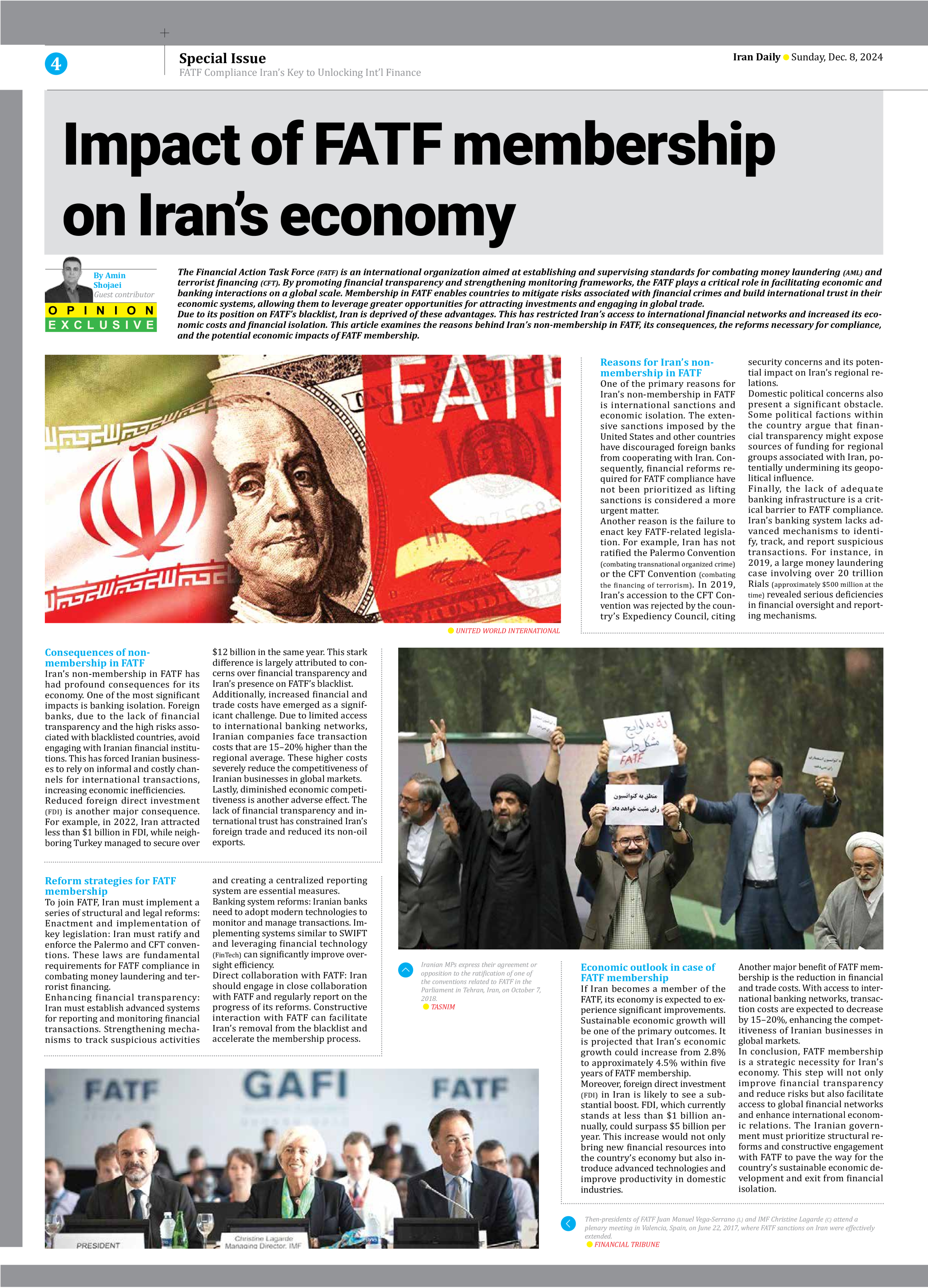
Impact of FATF membership on Iran’s economy
The Financial Action Task Force (FATF) is an international organization aimed at establishing and supervising standards for combating money laundering (AML) and terrorist financing (CFT). By promoting financial transparency and strengthening monitoring frameworks, the FATF plays a critical role in facilitating economic and banking interactions on a global scale. Membership in FATF enables countries to mitigate risks associated with financial crimes and build international trust in their economic systems, allowing them to leverage greater opportunities for attracting investments and engaging in global trade. Due to its position on FATF’s blacklist, Iran is deprived of these advantages. This has restricted Iran’s access to international financial networks and increased its economic costs and financial isolation. This article examines the reasons behind Iran’s non-membership in FATF, its consequences, the reforms necessary for compliance, and the potential economic impacts of FATF membership.
By Amin
Shojaei
Guest contributor
Reasons for Iran’s non-membership in FATF
One of the primary reasons for Iran’s non-membership in FATF is international sanctions and economic isolation. The extensive sanctions imposed by the United States and other countries have discouraged foreign banks from cooperating with Iran. Consequently, financial reforms required for FATF compliance have not been prioritized as lifting sanctions is considered a more urgent matter.
Another reason is the failure to enact key FATF-related legislation. For example, Iran has not ratified the Palermo Convention (combating transnational organized crime) or the CFT Convention (combating the financing of terrorism). In 2019, Iran’s accession to the CFT Convention was rejected by the country’s Expediency Council, citing security concerns and its potential impact on Iran’s regional relations.
Domestic political concerns also present a significant obstacle. Some political factions within the country argue that financial transparency might expose sources of funding for regional groups associated with Iran, potentially undermining its geopolitical influence.
Finally, the lack of adequate banking infrastructure is a critical barrier to FATF compliance. Iran’s banking system lacks advanced mechanisms to identify, track, and report suspicious transactions. For instance, in 2019, a large money laundering case involving over 20 trillion Rials (approximately $500 million at the time) revealed serious deficiencies in financial oversight and reporting mechanisms.
Consequences of non-membership in FATF
Iran’s non-membership in FATF has had profound consequences for its economy. One of the most significant impacts is banking isolation. Foreign banks, due to the lack of financial transparency and the high risks associated with blacklisted countries, avoid engaging with Iranian financial institutions. This has forced Iranian businesses to rely on informal and costly channels for international transactions, increasing economic inefficiencies.
Reduced foreign direct investment (FDI) is another major consequence. For example, in 2022, Iran attracted less than $1 billion in FDI, while neighboring Turkey managed to secure over $12 billion in the same year. This stark difference is largely attributed to concerns over financial transparency and Iran’s presence on FATF’s blacklist.
Additionally, increased financial and trade costs have emerged as a significant challenge. Due to limited access to international banking networks, Iranian companies face transaction costs that are 15–20% higher than the regional average. These higher costs severely reduce the competitiveness of Iranian businesses in global markets.
Lastly, diminished economic competitiveness is another adverse effect. The lack of financial transparency and international trust has constrained Iran’s foreign trade and reduced its non-oil exports.
Reform strategies for FATF membership
To join FATF, Iran must implement a series of structural and legal reforms:
Enactment and implementation of key legislation: Iran must ratify and enforce the Palermo and CFT conventions. These laws are fundamental requirements for FATF compliance in combating money laundering and terrorist financing.
Enhancing financial transparency: Iran must establish advanced systems for reporting and monitoring financial transactions. Strengthening mechanisms to track suspicious activities and creating a centralized reporting system are essential measures.
Banking system reforms: Iranian banks need to adopt modern technologies to monitor and manage transactions. Implementing systems similar to SWIFT and leveraging financial technology (FinTech) can significantly improve oversight efficiency.
Direct collaboration with FATF: Iran should engage in close collaboration with FATF and regularly report on the progress of its reforms. Constructive interaction with FATF can facilitate Iran’s removal from the blacklist and accelerate the membership process.
Economic outlook in case of FATF membership
If Iran becomes a member of the FATF, its economy is expected to experience significant improvements. Sustainable economic growth will be one of the primary outcomes. It is projected that Iran’s economic growth could increase from 2.8% to approximately 4.5% within five years of FATF membership.
Moreover, foreign direct investment (FDI) in Iran is likely to see a substantial boost. FDI, which currently stands at less than $1 billion annually, could surpass $5 billion per year. This increase would not only bring new financial resources into the country’s economy but also introduce advanced technologies and improve productivity in domestic industries.
Another major benefit of FATF membership is the reduction in financial and trade costs. With access to international banking networks, transaction costs are expected to decrease by 15–20%, enhancing the competitiveness of Iranian businesses in global markets.
In conclusion, FATF membership is a strategic necessity for Iran’s economy. This step will not only improve financial transparency and reduce risks but also facilitate access to global financial networks and enhance international economic relations. The Iranian government must prioritize structural reforms and constructive engagement with FATF to pave the way for the country’s sustainable economic development and exit from financial isolation.







